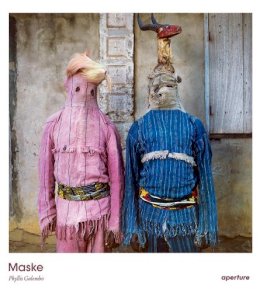18%OFF
Stock image for illustration purposes only - book cover, edition or condition may vary.
Maske
Phyllis Galembo
FREE Delivery in Ireland
Description for Maske
Hardback. .
For over two decades, Phyllis Galembo has documented cultural and religious traditions in Africa and among the African Diaspora. Traveling widely throughout western and central Africa, and regularly to Haiti, her subjects are participants in masquerade events—traditional African ceremonies and contemporary costume parties and carnivals— who use costume, body paint, and masks to create mythic characters. Sometimes entertaining and humorous, often dark and frightening, her portraits document and describe the transformative power of the mask. With a title derived from the Haitian Creole word maské, meaning “to wear a mask”, this album features a selection of over a hundred of ... Read morethe best of Galembo’s masquerade photographs to date organized in country-based chapters, each with her own commentary. The book is introduced by art historian and curator Chika Okeke-Agulu (himself a masquerade participant during his childhood in Nigeria), for whom Galembo’s photographs raise questions about the survival and evolution of masquerade tradition in the twenty-first century. Show Less
Product Details
Publisher
Aperture United States
Place of Publication
New York, United States
Shipping Time
Usually ships in 4 to 8 working days
About Phyllis Galembo
Phyllis Galembo is professor of art at the University of Albany, State University of New York. Her photographs have been exhibited at institutions around the world, including the American Museum of Natural History, New York; Fashion Institute of Technology, New York; George Eastman House, Rochester, New York; Kréyol Factory, Paris; Museum für Völkerkunde, Vienna; San Francisco Airport Museum; Schomburg Center ... Read morefor Research in Black Culture, New York; Smithsonian National Museum of Natural History, Washington, D.C.; Tang Museum, Saratoga Springs, New York; and Tokyo Metropolitan Museum of Photography. Her work has been collected by institutions, including the Library of Congress, Washington, D.C.; Metropolitan Museum of Art, New York; Museum of Fine Arts, Houston; New York Public Library; Philadelphia Museum of Art; Rockefeller Foundation, New York; and Yale Center for British Art, New Haven, Connecticut. In 1994, Galembo received a Senior Fulbright Research Award to photograph Kings, Chiefs and Women of Power: Images from Nigeria. She received a Hasselblad Masters Award in 2001 and an Artist’s Fellowship from the New York Foundation for the Arts in 2010. Galembo’s previous books include Divine Inspiration: From Benin to Bahia (1993), Vodou: Visions and Voices of Haiti (1998), and Dressed for Thrills: 100 Years of Halloween Costumes and Masquerade (2002). Phyllis Galembo is professor of art at the University of Albany, State University of New York. Her photographs have been exhibited at institutions around the world, including the American Museum of Natural History, New York; Fashion Institute of Technology, New York; George Eastman House, Rochester, New York; Kréyol Factory, Paris; Museum für Völkerkunde, Vienna; San Francisco Airport Museum; Schomburg Center for Research in Black Culture, New York; Smithsonian National Museum of Natural History, Washington, D.C.; Tang Museum, Saratoga Springs, New York; and Tokyo Metropolitan Museum of Photography. Her work has been collected by institutions, including the Library of Congress, Washington, D.C.; Metropolitan Museum of Art, New York; Museum of Fine Arts, Houston; New York Public Library; Philadelphia Museum of Art; Rockefeller Foundation, New York; and Yale Center for British Art, New Haven, Connecticut. In 1994, Galembo received a Senior Fulbright Research Award to photograph Kings, Chiefs and Women of Power: Images from Nigeria. She received a Hasselblad Masters Award in 2001 and an Artist’s Fellowship from the New York Foundation for the Arts in 2010. Galembo’s previous books include Divine Inspiration: From Benin to Bahia (1993), Vodou: Visions and Voices of Haiti (1998), and Dressed for Thrills: 100 Years of Halloween Costumes and Masquerade (2002). Chika Okeke-Agulu is associate professor of art history in the Department of Art and Archaeology, a core faculty member at the Center for African American Studies, and a member of the executive board of the Program in African Studies, for Princeton University. He was the Robert Sterling Clark Visiting Professor, Williams College, and is a fellow of the Clark Institute. He cocurated Seven Stories About Modern Art in Africa (Whitechapel, London, 1995), The Short Century: Independence and Liberation Movements in Africa, 1945-1994 (Museum Villa Stuck, Munich, 2001), and Who Knows Tomorrow (Nationalgalerie, Berlin, 2010). His writings on African and African Diaspora art and artists have appeared in journals, including South Atlantic Quarterly; Meridians: Feminism, Race, Transnationalism; Glendora Review; African Arts; and Art South Africa. He is coauthor (with Okwui Enwezor) of Contemporary African Art Since 1980 (2009), coeditor of Who Knows Tomorrow (2010), and editor of Nka: Journal of Contemporary African Art. Chika Okeke-Agulu is associate professor of art history in the Department of Art and Archaeology, a core faculty member at the Center for African American Studies, and a member of the executive board of the Program in African Studies, for Princeton University. He was the Robert Sterling Clark Visiting Professor, Williams College, and is a fellow of the Clark Institute. He cocurated Seven Stories About Modern Art in Africa (Whitechapel, London, 1995), The Short Century: Independence and Liberation Movements in Africa, 1945-1994 (Museum Villa Stuck, Munich, 2001), and Who Knows Tomorrow (Nationalgalerie, Berlin, 2010). His writings on African and African Diaspora art and artists have appeared in journals, including South Atlantic Quarterly; Meridians: Feminism, Race, Transnationalism; Glendora Review; African Arts; and Art South Africa. He is coauthor (with Okwui Enwezor) of Contemporary African Art Since 1980 (2009), coeditor of Who Knows Tomorrow (2010), and editor of Nka: Journal of Contemporary African Art. Show Less
Reviews for Maske
…contains more than a hundred of her most arresting images, each subject a riot of colour, symbolism and mystery. –The Telegraph They are colorful, intriguing and sometimes dark and forboding in nature, but these portraits of hers document the transformative powers and mystery of the mask. –Trey Speegle It is a really remarkable work –AnOther


